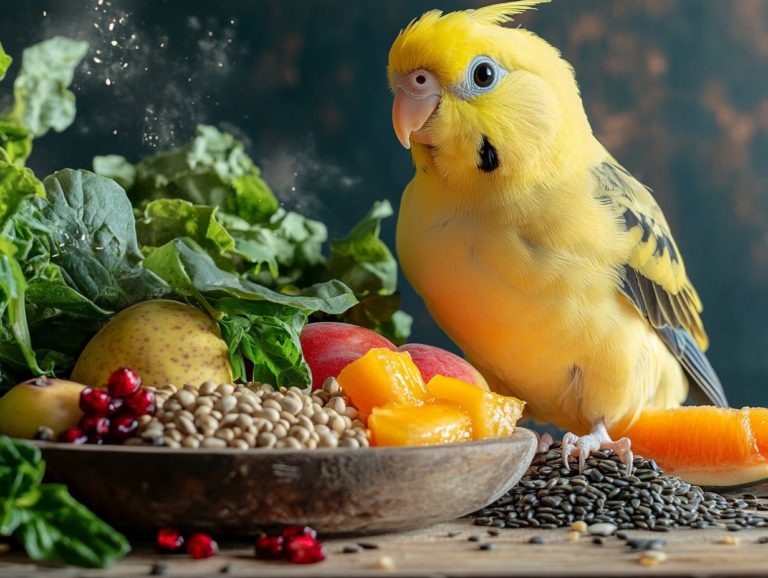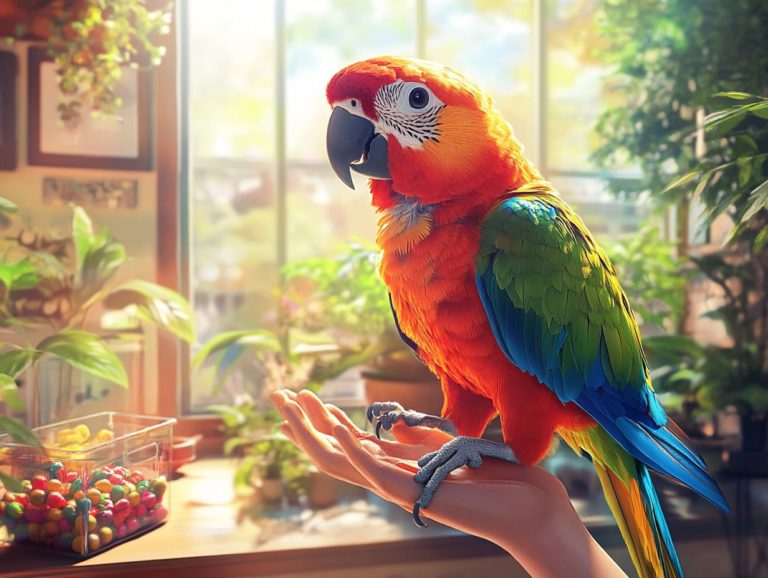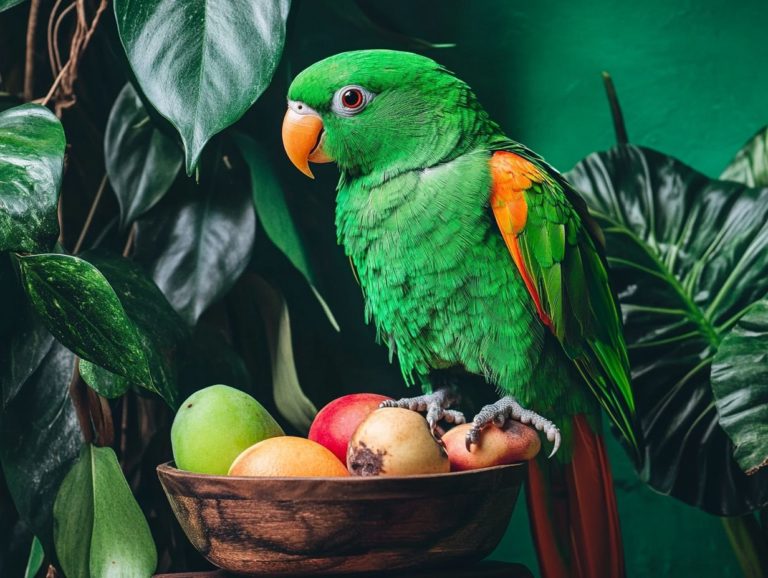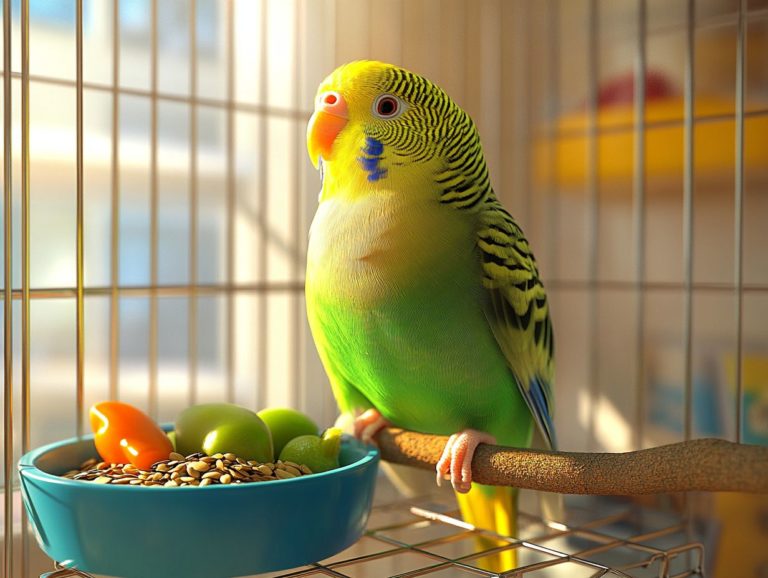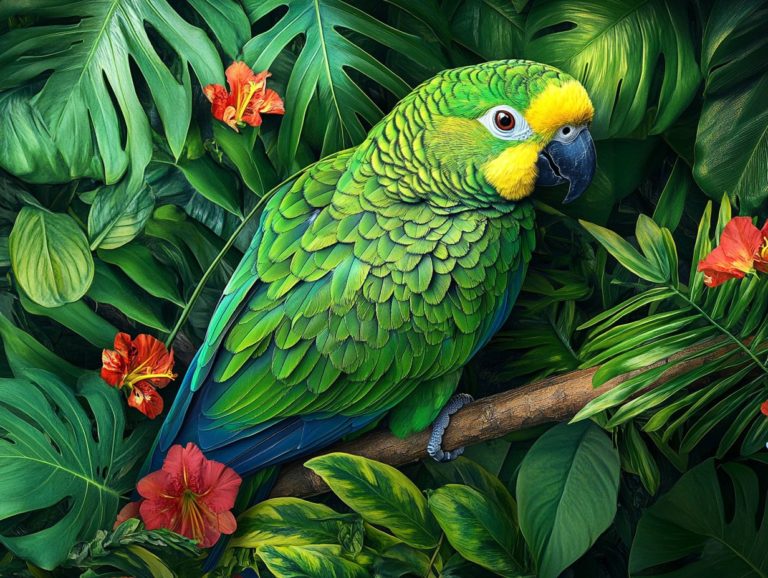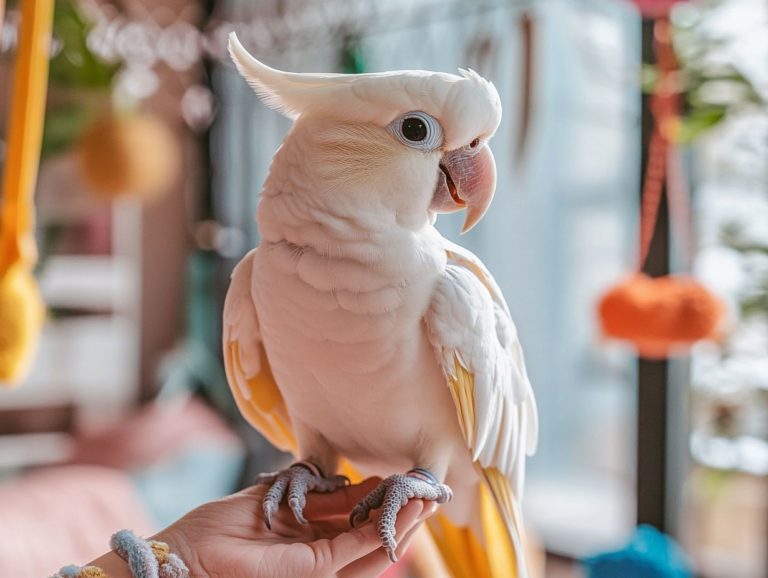10 Things to Know About Macaw Behavior
Macaws are truly captivating creatures, celebrated for their vibrant colors and striking personalities. If you re thinking about welcoming one of these social birds into your home or simply want to deepen your understanding of them, there s plenty to uncover.
From their loud vocalizations and playful antics to their specific dietary needs and impressive lifespans, macaws demand dedicated care and attention. This article delves into ten essential aspects of macaw behavior, providing insights into their unique personalities, communication styles, and tips for keeping them happy and healthy.
Get ready to dive into the amazing world of macaws!
Contents
- Key Takeaways:
- 1. Macaws Are Social Birds
- 2. They Require a Lot of Attention and Interaction
- 3. They Can Be Loud
- 4. They Are Intelligent and Curious
- 5. They Can Be Messy
- 6. They Need a Varied Diet
- 7. They Can Be Aggressive
- 8. They Are Bonded to Their Mates
- 9. They Need Plenty of Space to Move and Play
- 10. They Can Live for a Long Time
- What Are the Different Types of Macaws?
- How Do Macaws Communicate?
- What Are Some Common Behaviors of Macaws?
- How Can You Train a Macaw?
- What Are Some Tips for Bonding with a Macaw?
- What Are Some Common Health Issues for Macaws?
- What Are Some Ways to Keep a Macaw Happy and Healthy?
- How Can You Tell If a Macaw Is Stressed or Unhappy?
- What Are Some Common Misconceptions About Macaws?
- What Are Some Fun Facts About Macaws?
- Frequently Asked Questions
Key Takeaways:
- Macaws are highly social birds and need significant attention and interaction from their owners.
- They can be loud and require a varied diet to stay healthy.
- Macaws can live for a long time and need plenty of space to move and play to keep them happy and healthy.
1. Macaws Are Social Birds
Macaws are the social butterflies of the parrot family, dazzling everyone with their vibrant colors and unique appearances. Their playful and affectionate nature fosters emotional connections, making them ideal companions for those who appreciate dynamism in personalities. These intelligent creatures thrive in community living, forming strong bonds not only with their mates but also with their human caretakers, enriching their social interactions.
In the wild, you ll find macaws engaging in elaborate aerial displays and playful antics that highlight their vibrant characters, reinforcing the social structure within their flocks. They communicate through various vocalizations, establishing relationships and maintaining cohesion in their groups.
In captivity, these birds crave regular interaction and mental stimulation. Their need for companionship becomes evident as they eagerly join in games, mimic human speech, or bond closely with their owners. Picture a macaw happily perched on your shoulder, sharing playful moments a perfect embodiment of the joy and connection these remarkable birds bring into your life.
2. They Require a Lot of Attention and Interaction
Macaws require a significant amount of attention and interaction from you because they thrive on social engagement and bonding opportunities, making them one of the most captivating pet birds you can choose.
These vibrant creatures flourish in environments where their social needs are met through daily playtime and meaningful communication. Your role is vital. Regular interaction boosts the macaw’s happiness and builds trust.
Engaging in training sessions can take this relationship to new heights, providing mental stimulation while reinforcing positive behaviors. An ideal lifestyle for a macaw owner embraces an active schedule that allows ample time for direct engagement, ensuring that these magnificent birds remain happy, healthy, and emotionally fulfilled.
3. They Can Be Loud
Did you know macaws are renowned for their loud calls? This characteristic is rooted in their remarkable talking skills and their inherently social nature in the wild. You might often hear their vibrant communications reverberating through the rainforest canopy.
These vocalizations fulfill various roles, helping them establish territory, strengthen bonds within their flocks, and alert each other to potential threats. For example, a powerful call can serve as a warning about nearby predators, while softer sounds might suggest contentment or social engagement.
While this natural behavior is crucial for their survival, it raises certain considerations when thinking about them as pets in urban settings. The significant noise levels can create challenges in residential neighborhoods, potentially leading to complaints from neighbors and disrupting the overall harmony of your living situation. Therefore, as a prospective owner, you must thoughtfully balance the joy of having a macaw as a companion with the realities of their vocal demands.
Considering adopting a macaw? Make sure you’re ready for the commitment!
4. They Are Intelligent and Curious
Macaws stand out as some of the most intelligent and curious birds. They can learn and mimic human speech, making them truly captivating companions for those who embrace the art of training.
These vibrant creatures possess remarkable problem-solving skills. They often showcase their ability to navigate complex situations both in the wild and in captivity.
Their natural curiosity compels them to explore their surroundings and seek out new experiences, adding to their charm. To make the most of their smarts, provide structured training sessions that utilize positive reinforcement methods.
Incorporating interactive toys can greatly enhance their mental stimulation. This promotes vital skills while keeping their inquisitive minds engaged.
Activities such as puzzle-solving and obstacle courses not only challenge them but also significantly contribute to their overall well-being.
5. They Can Be Messy
Living with macaws offers a lively yet messy adventure. These spirited birds have a talent for scattering food and feathers, perfectly illustrating their energetic feeding habits and love for chewing everything in sight.
While the vibrant plumage of a macaw can undoubtedly elevate the aesthetic of any space, it also presents the ongoing challenge of maintaining a pristine living environment. You may find yourself frequently sweeping up an impressive collection of discarded seeds and feathers, which seem to multiply at an astonishing rate.
To keep the chaos in check, establishing regular cleaning routines becomes essential. Providing appropriate bird toys, like wooden blocks or rope swings, can effectively channel their chewing instincts into healthy playtime.
Creating a designated feeding area with a mat or tray can significantly reduce food scatter. This transforms cleanup into a less daunting task and contributes to a more organized aviary.
6. They Need a Varied Diet
Essential Nutrients for Your Macaw
Give your macaws a treat with a delightful mix of fruits, vegetables, nuts, and seeds! This mimics their natural feeding habits in the lush tropical rainforest.
This diversity is not just for their enjoyment; it s crucial for meeting their nutritional needs. For instance, blue-throated macaws require a diet rich in vitamin A, found in dark leafy greens and vibrant orange fruits, to support their vision and immune health.
Likewise, military macaws benefit from quality protein sources, such as high-quality pellets. Pair these with fresh offerings like bell peppers and apples to keep their feathers vivid and their overall health in check.
By understanding the specific dietary requirements of each species, you can ensure that your macaws enjoy a balanced diet that promotes their longevity and well-being. Start incorporating these dietary changes today to see a happier, healthier macaw!
7. They Can Be Aggressive
Despite their charming demeanor, macaws can show a feisty side, especially during their adolescent phase or when they feel threatened. This can lead to behavior problems that require your attentive management.
It’s essential for macaw owners to grasp the underlying factors that contribute to this aggression. Hormonal changes during maturation can increase sensitivity, resulting in surprising outbursts.
Fear from unfamiliar settings or sudden loud noises might trigger defensive behaviors. If socialization opportunities are lacking, it can create feelings of insecurity, causing these birds to act aggressively when they perceive a challenge.
To effectively manage such behaviors, it s vital to dedicate time to training that focuses on positive reinforcement. Understanding your macaw s moods is key to a loving bond!
Learn to read their signals to avoid letting aggression surprise you. By also learning to decode their body language, you can anticipate and address aggression before it escalates, ensuring a harmonious relationship with your feathered friend.
8. They Are Bonded to Their Mates
Macaws are remarkable for their strong bonding behaviors. They often form lifelong partnerships that reflect complex family relationships, especially during nesting season, when they show exceptional care for their young.
This commitment to one partner is essential for their emotional well-being and the overall fabric of their social structure. When you observe macaws as they choose a mate, you’ll notice a meticulous process based on compatibility and shared traits aimed at enhancing their survival as a pair.
The bond between them deepens through mutual grooming, vocalizations, and shared activities. These interactions allow trust to grow and their connection to solidify. As breeding approaches, the importance of this partnership becomes even clearer. Both parents work in harmony to build nests and rear their chicks. This teamwork creates a caring home, promoting emotional stability within their family unit.
9. They Need Plenty of Space to Move and Play
Macaws need plenty of space to stretch their wings and play, making a spacious and vibrant aviary the perfect home for these magnificent birds. They thrive on both physical activity and mental stimulation, so their environment should reflect that.
The space requirements can differ by species. For example, larger varieties like the Hyacinth benefit from enclosures that are at least 10 feet long. Smaller macaws, such as the Severe, can comfortably adapt to slightly smaller spaces.
To create an engaging habitat, it s vital to equip their living area with branches, swings, and a variety of bird toys that promote exploration and problem-solving. Incorporating regular social interactions and designated playtime outside their cage can significantly boost their physical exercise and mental well-being.
This holistic approach is essential for ensuring they remain healthy and content over the long term.
10. They Can Live for a Long Time
Macaws are remarkable companions, often boasting lifespans of 50 years or more. This longevity means that welcoming one into your life involves a significant emotional commitment to their care and well-being, especially if you want them to thrive as companions.
These incredible birds can live for decades, bringing joy and companionship to your life! You can ensure their happiness by providing a suitable diet rich in fruits, nuts, and seeds, alongside necessary mental stimulation and social interactions.
The environment is crucial; a spacious, enriching habitat that mimics their natural surroundings, like the tropical rainforest, is essential for their well-being. Regular healthcare, including veterinary check-ups and preventative treatments, is vital for ensuring they lead long, healthy lives.
If you re considering adding a macaw to your household, think carefully about the responsibilities that come with it. The bond you’ll form is deep and requires dedication, understanding, and love for many years to come, similar to the challenges faced by ideal macaw owners who truly appreciate their sweet temperaments.
What Are the Different Types of Macaws?
There are several distinct types of macaws, each boasting unique traits and characteristics that make them truly remarkable. You’ll find the vibrant blue-throated macaw, the charming Camelot macaw, and the robust military macaw, not to mention the ever-popular blue and gold macaw, each showcasing their own unique appearance.
Among these species, the scarlet macaw grabs attention with its breathtaking plumage and playful demeanor, making it a favorite among avian enthusiasts like yourself. Then there’s the hyacinth macaw, renowned for its impressive size and stunning cobalt hue. This type demands specialized care due to its dietary needs and spacious living requirements, similar to the feeding habits of other parrots.
These majestic birds thrive in a variety of habitats, from lush tropical rainforests to expansive savannas. While many are captivated by the idea of keeping macaws as pet birds, it s essential to understand their social behaviors and stimulation needs. This knowledge helps ensure their happiness and well-being in your home, especially considering their ability to mimic sounds and speech and their need for community living.
Think carefully before welcoming a macaw into your home are you ready for the commitment?
How Do Macaws Communicate?
Macaws communicate in fascinating ways, primarily using their loud calls to send messages to their flock. This highlights their remarkable ability to mimic sounds and reveals the intricate social dynamics at play.
These vibrant birds create a rich tapestry of vocalizations, from powerful squawks to softer chirps. Each sound serves a distinct purpose in their interactions. Beyond vocal sounds, macaws convey their feelings through body language fluffing their feathers, tilting their heads, or engaging in playful antics. These gestures communicate their emotional states and intentions clearly.
In their social structures, these interactions foster strong bonds, not just among themselves but also with humans. They learn to associate certain cues and responses with positive experiences, nurturing a unique form of companionship that beautifully transcends species. This is especially true for those who understand macaw behavior and appreciate their personality differences.
What Are Some Common Behaviors of Macaws?
Common behaviors of macaws include their playful antics, strong social bonds, and curious explorations of their surroundings. Understanding these traits can help you implement the 5 best practices for caring for macaws, enriching their lives and enhancing their relationships with you as their human companion.
These vibrant birds thrive on interaction and often engage in playful displays that entertain you while showcasing their remarkable intelligence. You ll find that they enjoy solving puzzles and eagerly explore new toys, reflecting their innate curiosity and desire for mental stimulation. These qualities highlight their appeal as playful birds.
Macaws are also known for their vocalizations. They use sounds to communicate with both their peers and you. This social interaction is vital for their emotional well-being, as forming strong bonds with you mirrors the dynamics found in their natural habitats. In the wild, flocking is essential for survival and companionship, reflecting their breeding age and family dynamics.
How Can You Train a Macaw?
Training a macaw is an exciting adventure that strengthens your bond! It can help address potential behavioral issues like destructive chewing while enhancing their natural abilities and social skills.
By using effective training techniques, particularly positive reinforcement rewarding your macaw with treats or praise when they do something right you can create an environment where these intelligent birds truly flourish. Consistent commands will help your macaw understand what s expected of them, paving the way for clearer communication and reinforcing your emotional connection.
Engaging in interactive activities, like puzzle toys and flying exercises, stimulates their minds and strengthens the bond between you and your pet. You ll see two major benefits: as your macaw becomes more skilled in their interactions, you will enjoy a more harmonious relationship, creating a happier living environment for both of you and addressing any potential behavioral problems.
What Are Some Tips for Bonding with a Macaw?
Bonding with a macaw requires your patience, consistency, and a genuine willingness to engage in playful activities that nurture emotional connections and build mutual trust. This paves the way for a lasting emotional connection.
Establishing a routine is crucial, as these vibrant birds thrive in structured settings. Daily interactions whether it’s through gentle conversations or playful sessions with bird toys help the macaw become familiar with your voice and presence.
By understanding their unique needs, including a proper diet that mimics their feeding habits, social interaction, and mental stimulation, you significantly enhance your relationship with them. Gradually introducing new experiences can foster trust, helping the macaw feel secure in its environment.
Remember, every small effort matters; each positive interaction you share will strengthen the bond over time, reinforcing the significance of your role as their human companion.
What Are Some Common Health Issues for Macaws?
Common health issues for macaws can often be prevented with a focus on a nutritious diet, regular vet check-ups, and a keen awareness of their behavioral needs. This ensures they live long and vibrant lives as they face challenges like illegal trapping in the wild.
These stunning macaws are a joy to behold and are susceptible to not getting enough nutrients that can lead to various ailments, including weakened immune systems and feather plucking. Obesity is another significant concern, often stemming from an inadequate diet and insufficient exercise, which can result in heart disease or joint issues.
Behavioral problems can emerge from boredom or lack of interaction, such as excessive screeching or destructive chewing. By prioritizing preventive care and providing a balanced diet rich in essential nutrients, you can support the well-being of these beautiful creatures and promote a fulfilling life.
It’s also important to acknowledge their breeding age and overall health.
What Are Some Ways to Keep a Macaw Happy and Healthy?
Keeping a macaw happy and healthy requires you to create a stimulating environment filled with engaging bird toys, dedicate regular playtime, and provide a balanced diet tailored to their specific needs.
Reflecting their unique feeding habits is crucial. Implement various strategies that boost their overall well-being. Engage in environmental enrichment by rotating toys and introducing new textures and scents; this keeps their minds sharp and curious.
Social interaction is equally important spending quality time with your macaw and, when possible, allowing them to mingle with other playful birds can help prevent loneliness and foster strong bonds.
Ensure their diet consists of a variety of fresh fruits, vegetables, and high-quality pellets to support their physical health. Remember, playtime isn t just a luxury; it s a necessity that promotes exercise and mental stimulation, both of which are crucial for their happiness and longevity, especially as they navigate their adolescent behavior.
How Can You Tell If a Macaw Is Stressed or Unhappy?
Recognizing when your macaw is stressed or unhappy is vital for maintaining their emotional health. Watch for changes in your macaw’s sounds and behavior, as these can reveal the impact of their environment on their well-being.
These stunning macaws may show signs of distress, such as withdrawal. They might choose to isolate themselves rather than engage with you or their surroundings. Excessive vocalization can also serve as a key indicator; your macaw might squawk or screech more than usual, seeking to express discomfort or anxiety.
You may also notice fluctuations in their appetite. Some birds may refuse to eat, while others suddenly crave specific foods, emphasizing their unique feeding habits.
To create a comfortable environment that nurtures their well-being, it s essential to establish a consistent routine, provide plenty of stimulating toys, and ensure they have a safe, spacious area to explore. This approach helps mitigate stress and encourages a happier disposition for your feathered companion.
What Are Some Common Misconceptions About Macaws?
There are numerous misconceptions about macaws that can lead to misunderstandings regarding their needs and behaviors. This often results in inappropriate training methods or unrealistic expectations for pet ownership.
You might think that macaws are low-maintenance due to their stunning appearance and playful nature. However, the reality is that caring for one demands a significant commitment both mentally and financially.
These birds are not just beautiful; they are highly intelligent and social creatures that thrive on interaction and mental stimulation. If you fail to provide them with adequate attention, you could face behavioral issues like aggression or destructive tendencies.
Another common myth is that macaws are naturally aggressive. In truth, they can be incredibly affectionate and loyal companions when they receive proper training and socialization. Before deciding to welcome one of these magnificent creatures into your home, it’s essential to conduct thorough research and truly understand what it takes to care for them.
What Are Some Fun Facts About Macaws?
Did you know that macaws are stunning and playful? They have fascinating traits that make them extraordinary.
Their exceptional ability to learn sounds and talk, along with intricate social structures in lush rainforests, shows a depth beyond mere appearance.
These birds amaze with their mimicry skills. They can imitate natural sounds and even human speech! You might be surprised by how clearly they reproduce sounds, leaving listeners in awe.
With wingspans reaching up to three feet, macaws are not just visually striking but also powerful fliers. They navigate through tree canopies with impressive agility.
Each species boasts unique characteristics that highlight nature’s artistic diversity. From the deep blue feathers of the Blue-and-yellow Macaw to the vibrant reds and yellows of the Scarlet Macaw, these birds are a living testament to the beauty of the natural world.
Macaws hold a significant place in American culture, symbolizing freedom and the richness of biodiversity. They remind us of the delicate balance within our ecosystems, encouraging a deeper appreciation for the wonders of our environment.
Frequently Asked Questions
1. What are some common behaviors exhibited by macaws?
Macaws are known for their loud vocalizations, playful nature, and curiosity. They tend to chew on objects and can be quite destructive if not given proper toys and enrichment activities.
2. Do macaws make good pets?
Macaws can make great pets for the right owner. They require a lot of time and attention, as well as a large living space, so they may not be suitable for everyone.
3. Why do macaws scream so much?
Screaming is a natural behavior for macaws; it’s how they communicate with other birds in the wild. In captivity, they may scream for attention, boredom, or to express excitement or fear.
4. How can I prevent my macaw from becoming bored?
Macaws are intelligent birds needing mental stimulation to prevent boredom. Offering a variety of toys, puzzles, and training activities can keep them entertained.
5. Is it normal for macaws to bond with just one person?
Yes, macaws often form strong bonds with their owners and can become territorial or aggressive towards others. Proper socialization and training can help prevent this behavior.
6. Are macaws prone to any specific behavior problems?
Macaws can develop various behavior problems if not properly cared for, including feather plucking, aggression, and excessive screaming. It’s important to provide them with a balanced diet, plenty of exercise, and mental stimulation to prevent these issues.

